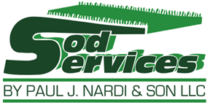Sod Services LLC
Lawn Care Program
Lawn Care Program
A yearly treatment program is one of the most crucial parts that contribute to the long-term success of your newly installed or existing lawn. We offer a 6- step program of fertilization and weed controls beginning in March and extending through the end of November. We will build your program specific to your property needs. Listed below we provide details on our lawn care program as well as additional services you can add to your program.
Benefits to a lawn care program….
- Provides a rich, green turf color
- Keeps grass thick and root structure healthy which promotes better growth
- The thicker the lawn the fewer weeds are present
Season Steps
- Step 1: Early Spring - Pre-emergent crabgrass control and fertilizer
- Step 2: Late Spring - Pre-emergent crabgrass control, fertilizer and apply broadleaf weed control
- Step 3: Early Summer – Balanced fertilizer and spot weed treatment
- Step 4: Late Summer – Slow release fertilizer and spot weed treatment
- Step 5: Early Fall – Fertilizer and apply broadleaf weed control
- Step 6: Late Fall – Fertilizer to promote winter hardiness
Additional Services you can add to your program
Liming
Lime is applied in the spring and the fall. By applying lime to your lawn this will improve soil structure and enhance the growth of beneficial soil microorganisms. This also regulates soil acidity and balances nutrients in the soil.
Disease Control
Heat and humidity can cause disease in your lawn such as dollar spot, summer patch and brown patch. If there is something that doesn't look right with your lawn give us a call. Once we can get a good look at it and we determine there is disease present we will recommend a liquid fungicide to control disease activity. Follow up treatments may be necessary.
Insect Control
Some insects such as sod webworms and chinch bugs can destroy a lawn. If there is something that doesn't look right with the lawn give us a call. Upon inspection of the lawn and we determine there are damaging insects on site we will recommend a liquid insecticide to control insect activity. Follow up treatments may be necessary.
Grub Control
Grubs are insects that attack the root system of the grass. Treatments are recommended every summer to rid the lawn of such insects. Applying this every year will guarantee your lawn will not be destroyed by grubs.
Core Aeration
(Every Fall with seed) Aeration allows oxygen, water and nutrients to the root system of your lawn. Also relieves compacted soil. Seeding should be performed with the aeration for a thicker, healthier lawn. Yearly aeration/seeding can eliminate spring thatching.
Overseeding
(Every Fall with core aeration) Seeding should be performed every fall along with aeration to strengthen, as well as to thicken your lawn.
Thatching
(Fall) Gets rid of debris that has accumulated over on the surface time. Allows the lawn to obtain the proper nutrients. This is done in conjunction with core aeration/seeding only if necessary. We can also add topsoil to top dress the areas that were thatched if needed. A thorough evaluation of the condition of the lawn will let us know if this added process is needed.
Perimeter Pest
Applied as a 3-step program. A form of liquid insecticide sprayed around the foundation of your home to eliminate insects from entering your home from the outside. We spray around the entire foundation of your house and concentrate on areas around basement windows and cracks in the foundation.
Nutsedge/Kyllinga control
Summertime weedy grasses can be a real eyesore in a lawn. We developed a program that will specifically target such weeds. Nutsedge is best described as that grass that grows much faster than the rest of your lawn. It grows in individual “tubers” and sticks out and is very noticeable a day or so after the lawn is mowed. You’ll notice this right around Memorial Day through September. This spray is designed to shrink the population with each application and eventually get rid of it. Read more
Kyllinga is something kind of new to this area. Its another weedy grass that is in the same family as nutsedge. However, it grows in small patches that will get bigger over time and will have tiny balls on the top of the stem (seed heads). It disguises itself very well in existing lawns as it grows amongst your existing grass and is hard to spot without a trained eye. If left untreated it can take over your lawn. It will go dormant in the late Fall and reappear again the following Summer. If you don’t’ notice it in the Summertime you will for sure notice it once it goes dormant in late Fall. This will turn orange/yellow and you’ll notice it until Springtime comes around. Read more

